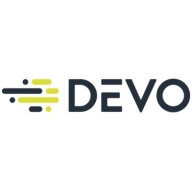

Check Point Security Management and Devo are competitive in cybersecurity management. Devo has a slight advantage in features and value proposition, yet Check Point scores well in pricing and support.
Features: Check Point offers strong security capabilities, comprehensive threat prevention, and protection-focused solutions. Devo stands out with advanced analytics, scalable infrastructure, and adaptability in data handling.
Room for Improvement: Check Point users look for simpler management processes, improved documentation, and clearer interfaces. Devo's users recommend better documentation, refined initial setup processes, and faster customer support experiences.
Ease of Deployment and Customer Service: Check Point has a straightforward deployment and responsive support, although some find management complex. Devo shines with seamless cloud integration, but users report some delays in support responses.
Pricing and ROI: Check Point offers competitive pricing with consistent ROI, appealing to budget-focused customers. Devo, despite higher initial setup costs, provides substantial long-term ROI, ideal for those investing in analytics benefits.
| Product | Market Share (%) |
|---|---|
| Check Point Security Management | 0.5% |
| Devo | 0.7% |
| Other | 98.8% |


| Company Size | Count |
|---|---|
| Small Business | 37 |
| Midsize Enterprise | 28 |
| Large Enterprise | 41 |
| Company Size | Count |
|---|---|
| Small Business | 7 |
| Midsize Enterprise | 4 |
| Large Enterprise | 11 |
Check Point Security Management is an advanced security management platform for enterprises. The platform integrates all aspects of security. A single platform manages the entire infrastructure, from data centers to private/public cloud deployments.
Check Point Security Management is a reliable and easy-to-use security platform. It integrates all aspects of your security environment to strengthen the security posture without impairing productivity. The system has a layered policy model. This means the security policy can be separated into layers for network segmentation. Different administrators can manage different policies. The policy layer automates the tasks.
The platform is extensible, scalable, and integrates easily with orchestration systems and change management.
Basic Components of the Infrastructure
The smart console offers several advantages. Changes in security policies and logs can be done with a click. You can navigate from an item within a log to the policy. There are also built-in multi-language support and accessibility features.
1. Security Management Server: The server manages security gateways with set security policies and monitors security events on the network.
The automation server is an integrated part of the management server. The API server is active by default on servers with 4 GB of RAM or more and on standalone servers with 8 or more GB of RAM.
The automation server communicates with the management server the same way as the Smart Console. This architecture allows the same validation errors and warnings to be presented when using an automation session.
The same audit logs generated using the Smart Console are also generated using an automation session. If you have a multi-domain environment, there is only one automation server that monitors all the IP addresses of the multi-domain management server.
2. Security Gateway is placed at the edge of the network. It monitors and filters traffic and enforces security policies.
Logging, Event management, and Monitoring
With Check Point Security Management, logging, reporting, event management, and monitoring are integrated. The platform features widgets and chart templates that optimize visibility. One of the best features is the one-click exploration. This simplifies going from a general overview to specific event details.
Benefits of Check Point Security Management
The unified console also means a single policy for users, data, applications, and networks. The granularity control helps accelerate administration processes. This feature, together with automation, is key to achieving reduced operational overhead. Security teams can automate tasks and even create self-service security web portals with the Check Point Security Management platform.
Threat management is fully integrated, with reporting, logging, and monitoring all in one dashboard. This provides full visibility into the security of the network.
Security Management Suite
The Security Management Suite consists of the following modules:
Reviews from Real Users
A Network Security Engineer/Architect at a tech services company says, "The features we like and find the most valuable are the ways we can manage the policy, create objects, and drag and drop objects in our daily operation. It makes our daily operation on the firewall management much easier than going, for example, to one firewall, then going to the other."
"The management API is the best new feature for me. It allows us to further automate our customers' automated server ordering," says a System Engineer Network & Security at OTTO GmbH & Co KG.
A Senior Infrastructure Services Specialist at St.George Bank Limited adds that "The solution is ideal for use and deployment in a large infrastructure environment."
Devo is the only cloud-native logging and security analytics platform that releases the full potential of all your data to empower bold, confident action when it matters most. Only the Devo platform delivers the powerful combination of real-time visibility, high-performance analytics, scalability, multitenancy, and low TCO crucial for monitoring and securing business operations as enterprises accelerate their shift to the cloud.
We monitor all Log Management reviews to prevent fraudulent reviews and keep review quality high. We do not post reviews by company employees or direct competitors. We validate each review for authenticity via cross-reference with LinkedIn, and personal follow-up with the reviewer when necessary.